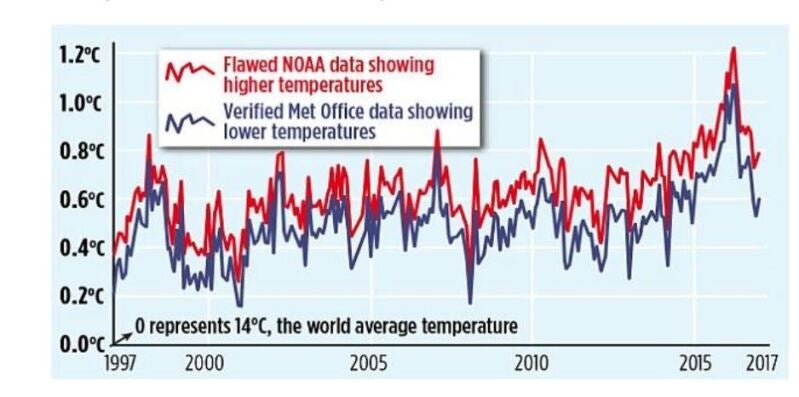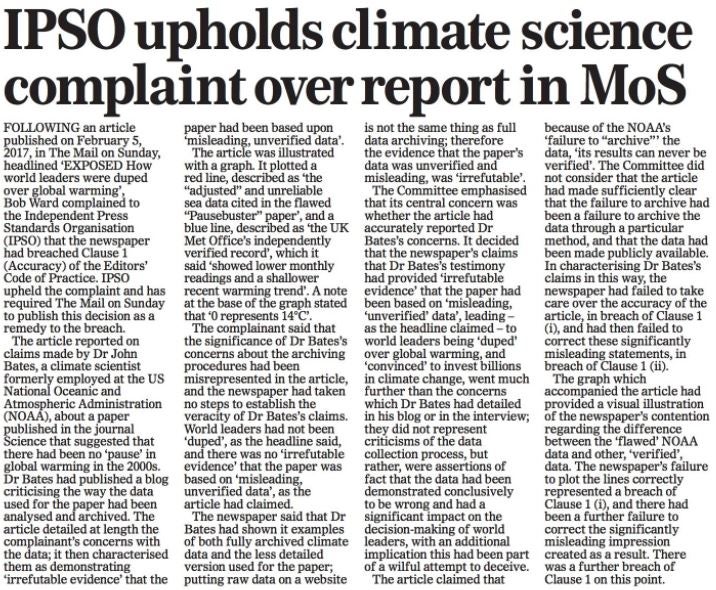
The Mail on Sunday has been censured by press watchdog IPSO over a story which wrongly stated that world leaders had been “duped over global warming”.
The story was published on pages 10, 11 and 12 on 5 February and was headlined: “EXPOSED How world leaders were duped over global warming”.
It reported that leading US climate scientist Dr John Bates had undermined research from America’s National Oceanic Atmospheric Administration published in 2015 which found that a claimed pause in global warming since 1998 never existed.
It said that Bates “has shown The Mail on Sunday irrefutable evidence that the paper [known as the Pausebuster paper] was based on misleading, ‘unverified’ data”.
It said the NOAA had published the “sensational but flawed report”, because its failure to archive data had meant that “the Pausebuster paper can never be replicated or verified by other scientists”.
Complainant Bob Ward, of the Grantham Research Institute on Climate Change, said the article had “made a number of extraordinary claims, which were misleading and inaccurate, including a ‘fake graph'” [pictured below].

He said that the significance of Dr Bates’ concerns about the archiving procedures had been misrepresented in the article, and the newspaper had taken no steps to establish the veracity of Dr Bates’ claims.”
Upholding the complaint, the IPSO committee said: “The article had characterised Dr Bates’ testimony as providing irrefutable evidence that the paper had been based on misleading, unverified data, leading – as the headline claimed – to world leaders being duped over global warming, and convinced to invest billions in climate change.
“These claims by the newspaper went much further than the concerns which Dr Bates had detailed in his blog or in the interview; they did not represent criticisms of the data collection process, but rather, were assertions of fact that the data had been demonstrated conclusively to be wrong and had a significant impact on the decision making of world leaders, with an additional implication this had been part of a willful attempt to deceive.”
It said: “Dr Bates had challenged the findings, as he was entitled to do; however he had not proven them to be false, nor had he suggested that the authors of the study had acted dishonestly. Having considered Dr Bates’ claims in detail, the Committee concluded that they did not constitute or identify ‘irrefutable evidence’ that the data was ‘misleading’ or that leaders had been ‘duped’. The newspaper had failed to take care over the accuracy of the article.”
On the archiving point, IPSO said: “The Committee did not consider that the article had made sufficiently clear that the failure to archive, had been a failure to archive the data through the NOAA’s archiving procedure for operational data only; the data had been made publicly available on the FTP site.
“Further, the newspaper did not dispute that the results had been independently validated as part of the Science peer review process, after publication of the paper. In characterising Dr Bates’ claims in this way, where he had expressed the precise nature of his concerns clearly in this blog and during the interview, the newspaper had failed to take care over the accuracy of the article.”
IPSO also found that the graph used by the Mail on Sunday was misleading.
“The graph which accompanied the article had provided a visual illustration of the newspaper’s contention regarding the difference between the ‘flawed’ NOAA data and other, ‘verified’, data.
“The newspaper’s failure to plot the lines correctly represented a breach of Clause 1 [accuracy]; the result was significantly misleading and required correction under Clause.
“While the Committee noted that the newspaper had amended the graph’s caption to make clear that the two data sets were plotted using different baselines, and had referenced this inaccuracy in a later article, this did not constitute a correction under the terms of Clause 1.
“It did not clearly identify the inaccuracy or set out the correct position, and was not sufficiently prominent as a single sentence in a longer article, which was not distinguished as a correction. There was a further breach of Clause 1 on this point.”
The critical IPSO adjudication was published in the Mail on Sunday yesterday.

Email pged@pressgazette.co.uk to point out mistakes, provide story tips or send in a letter for publication on our "Letters Page" blog
